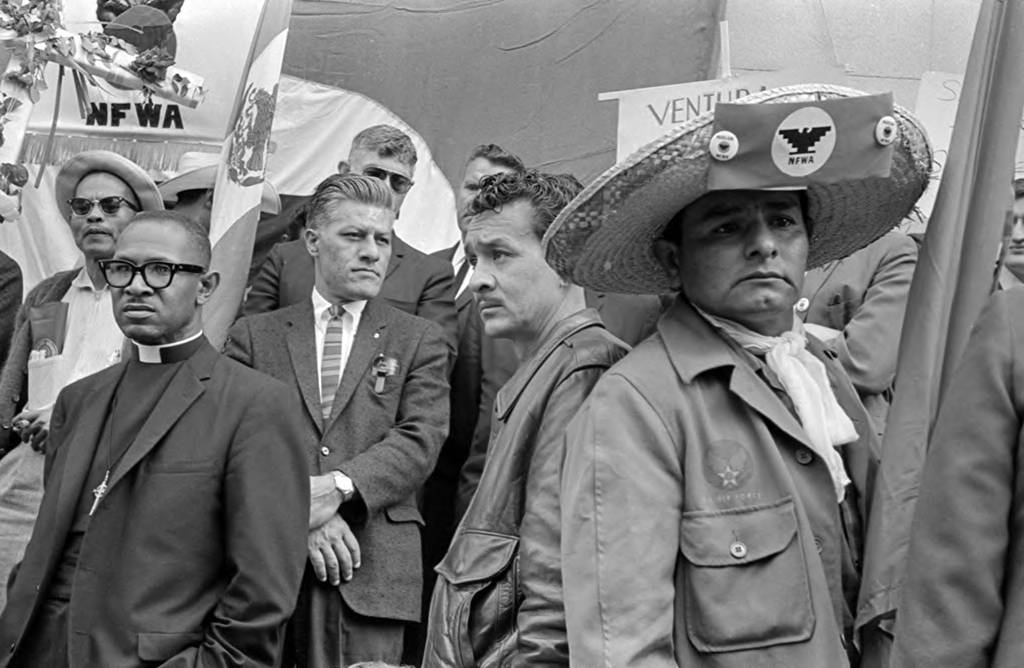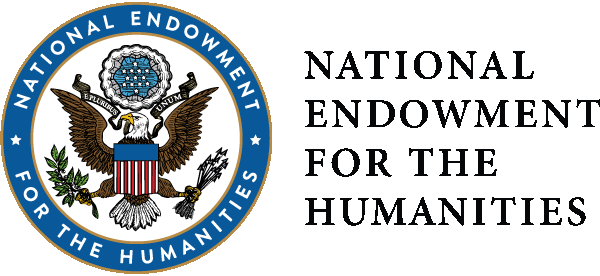Epifanio Camacho
Epifanio Camacho
Epifanio Camacho speaks to a crowd in front of the State Capitol at the end of the march to Sacramento, April 10, 1966. Photo by Emmon Clarke.
Epifanio Camacho was one of the first organizers of the National Farm Workers Association (NFWA). He was born on a small ranch in Tamaulipas in rural Mexico during the 1920s, and on June 6, 1955, he crossed the border legally and worked in fields picking cotton in Texas and Arizona—loading lettuce alongside the bracero workers in the Imperial Valley; picking fruit up and down California including wine grapes in Delano and grafting roses in McFarland. Camacho saw he and others were being cheated of their wages. He attempted to demand back his wages and even brought up the issue to the state labor commissioner in Bakersfield. Konklyn Nursery offered to tip Camacho, who refused; the commissioner declared Camacho ungrateful and closed the hearing.
Epifanio Camacho stands on the road with a billboard in the distance during the march to Sacramento, 1966. Photo by Emmon Clarke.
In 1965, Manuel Rivera reached out and told him about Cesár Chávez. Camacho immediately joined the NFWA and suggested a strike at first, but Chávez was hesitant, explaining that the association was focused on building its membership first. Chávez told Camacho to gather more grafters to listen to their stories. At the second meeting, Camacho focused on one company, Mount Arbor, and 30 grafters showed up where they decided they wanted to strike. Chávez did not oppose their view and the NFWA prepared for its first strike. The grafters agreed on their wage demand, that they wanted a contract, and that the NFWA would represent them in negotiations with the company. The strike lasted three days. The rose grafters won a wage hike but not a contract. Within a couple of weeks, the other rose companies also raised their wages, as they were afraid to lose their best grafters to Mount Arbor.
Epifanio Camacho, Gilbert Padilla, Larry Itliong, and Al Krebs standing in front of the State Capitol, Sacramento, 1966
NFWA member Epifanio Camacho stands in front of the State Capitol on the last day of the march. He is wearing a sombrero with the black eagle, symbol of the farmworker movement and struggle. NFWA leader Gilbert Padilla is standing next to him, to the left, and Al Krebs, a reporter with the Religious News Service is also visible in the background wearing sunglasses. Larry Itliong, AWOC leader, is on the left with a hat and sunglasses. At the rally in front of the State Capitol, the 57 farm workers who had walked the entire way from Delano, were sitting on the stage. The NFWA speakers were Epifanio Camacho, Dolores Huerta, Augustín Lira, and César Chávez, with Gilbert Padilla introducing them. A strong coalition was on display, with Catholic, Protestant, and Jewish leaders pledging their support to the NFWA and with officials belonging to competing unions, Bill Kircher and Louis Goldblatt (ILWU), Jack Goldberger (Teamsters), and Paul Schrade (UAW), addressed the crowd. The speeches were interrupted by the supporters in the audience chanting the NFWA anthem song, De Colores.
Camacho was a fiery orator, and he delivered a memorable speech on Sept. 16, 1965, in support of joining the grape strike of Filipino workers. In the years following the strike, Camacho, and Chávez were at odds; he disagreed with Chávez’s no-violence philosophy and his political and religious affiliations. Camacho was arrested multiple times for defending the farmworkers on the picket line and his outbursts caused a deeper rift between him and Chávez, who ousted him.
Epifanio Camacho and Eliseo Medina picketing at a Perelli-Minetti vineyard, Delano, ca. 1966. Photo by Emmon Clarke.
Their relationship became strained when Chávez declared himself an anti-communist in 1968 and condemned all other farmworkers who identified as communists. At the time, Camacho also declared himself an anti-communist, but the ideas of working-class struggle were starting to sow inside. In 1974, the Progressive Labor Party reached out to him. It was Camacho’s relationship with this party that divided him from Chávez and the union, though he was not alone since the party newspaper, Challenge/Desafío did attract a number of farmworkers to its ideas.
Tom & Ethel Bradley Center
California State University, Northridge
18111 Nordhoff Street, Northridge, CA 91330
Phone: (818) 677-1200 / Contact Us


